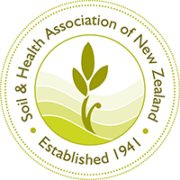Organic weed solutions
There is an unfortunate trend online of people recommending using salt as an organic weed killer. Yes, salt is natural, but it’s not healthy for the ecosystem to add salt. David Whyte finds out why, and suggests some organic solutions to weed control.
We hope you enjoy this free article from OrganicNZ. Join us for access to exclusive members-only content.
Just because something is natural doesn’t mean it’s necessarily healthy or good. For example lead and mercury are natural products found in the environment, but one would not want high levels in the soil, or the home, since they are highly toxic.
Paths and driveways
The suggested use of salt as a weed killer is to place or pile salt on weeds that are present where you don’t want them, typically footpaths and driveways but I’ve also seen it used on gardens, and suggestions to place it around the vegetable garden to kill off slugs and snails.
Adding salt to kill a weed on say, a concrete path, means the salt will not only kill that plant, but stress or kill plants and life around the path. The salt will dissolve in rainwater and be carried into or across the soil, to poison plants nearby. These plants may not die, but may become salt stressed, and therefore more likely to be attacked by pest insects and disease.
No breakdown, only dilution

We tend to think of freezing as a pre-winter activity, but it can be useful as summer arrives, too. Since salt is made up of just sodium and chloride ions, it doesn’t break down. Even harmful pesticides like DDT and glyphosate – given the right environment – will over time break down to atoms and molecules that are harmless. Sure, specific fungi and microbiology are required, and if these are not present it can take decades and decades. But the land can eventually be remediated.
The only way salt-contaminated soil can be restored is by washing out the sodium and chloride ions. All this does is use the ‘solution to pollution is dilution’ principle. That is, the sodium and chloride are still there, just enough washed out of the soil that things can grow again. But the salt will enter the ground water or surface watercourses, and if the levels are high enough, the ground water or surface water will be permanently contaminated and toxic to life.
Sucking the water out
There are several ways salt kills things. First, it dehydrates things. This is the reason one can preserve meat and other products that would otherwise quickly go off. The salt dehydrates the bugs that would spoil the meat, thus preserving the meat from degrading. It’s also used in preservation techniques to allow specific bugs to grow, while preventing others from growing. Preserving olives or cabbage in brine restricts what bugs can grow and thrive.
The same thing happens in the soil. The salt kills off the good soil bugs by dehydrating them. It kills or drives away any insects or other creatures like worms, which get dehydrated and die. It dehydrates plants as well, either by stopping the water being taken up by the plants, or by actively removing water from the plants, causing them do die. Add too much salt and your soil will become sterile and lifeless.
Mismatched chemistry
Table salt dissolves in water into sodium and chloride ions. The sodium replaces potassium when taken in by plants and animals. (Potassium is the ‘K’ part of the NPK which is critical to plants’ growth and survival.) It does this because chemically sodium and potassium are similar. But they’re not exactly the same, so biochemical processes don’t work as they should when sodium replaces potassium, leading to plant death.
Ions are atoms with a net electric charge, so they interact with things. Chloride ions are toxic to plant life, and plants attempt to get rid of it by storing it in the leaves, causing leaf burn and death of leaves.
Harmful leaching or heavy metal uptake
The impacts of salt in the soil are really concerning. For example high salt levels cause soils to leach more nitrates into the water. The naturally occurring nitrogen cycling in the soil (which converts nitrates into other forms that don’t run off) is interrupted. So using salt could increase water pollution.
High salt levels in the soil increase the uptake by brassica plants (cabbage family) of the heavy metal cadmium. Salt reduces the water-holding capacity of soils, increases the levels of the toxic cyanobacteria as the ‘good’ bacteria in soils are killed off.
First do no harm
If I sat down and started eating glyphosate (the active ingredient in herbicides such as Roundup) and table salt, which one would kill me first? The table salt would. In fact infants with low body weight and access to table salt can ingest enough that they require hospitalisation.
We’re all aware of the negative impacts of glyphosate on the environment. And the impact of salt would be even worse. There are alternative solutions to weed challenges so let’s pursue these healthy alternatives before considering anything harmful.

David Whyte is a researcher, writer and speaker who has a hobby orchard and is passionate about healthy food production. He is president of the New Zealand Tree Crops Association: treecrops.org.nz.

